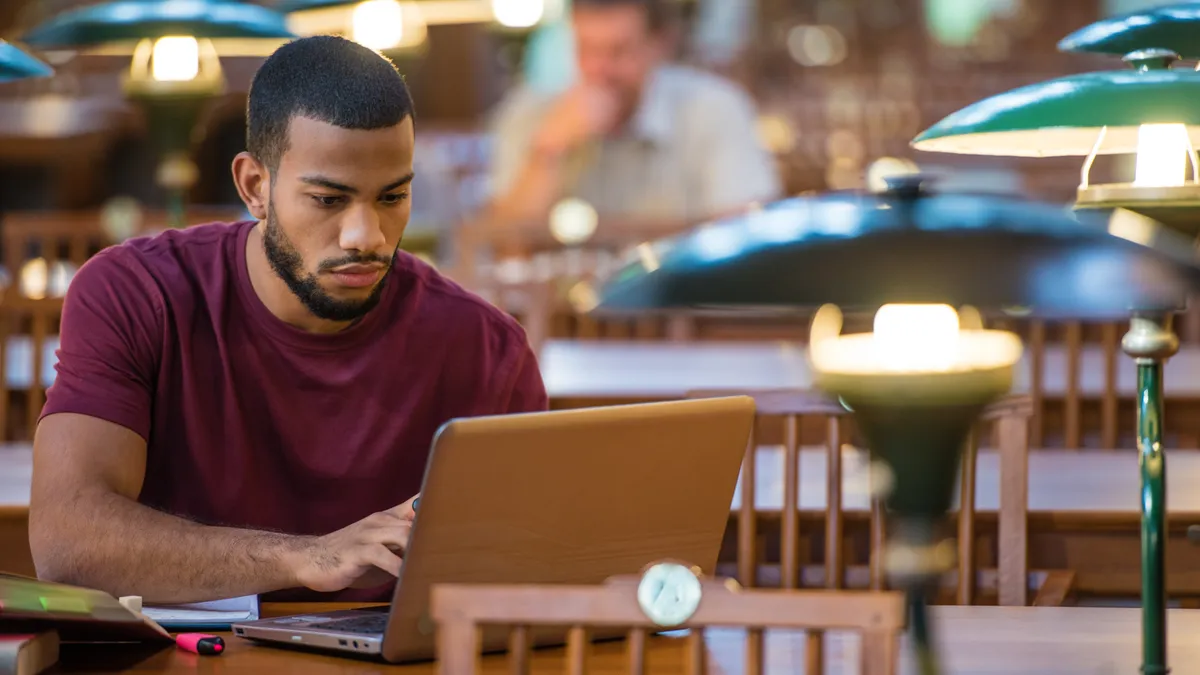Editor's note: In this column, we look ahead at how the coronavirus pandemic could affect aspects of higher ed in the long term.
Before the coronavirus pandemic took hold in the U.S., users of the online therapy service TAO Connect logged about 20,000 minutes of videoconferencing a month on its platform. In April, the company surpassed 70,000 minutes in a single day.
A large share of that business came from colleges and universities, said Sherry Benton, TAO Connect's founder and chief science officer, in an interview with Education Dive. Their counseling centers can use the company's videoconferencing tool for appointments and its self-paced learning modules to supplement therapy.
As colleges finish the academic year remotely due to the coronavirus, scores of counseling centers are looking to quickly build the digital infrastructure needed to continue their services online.
To do so, universities are signing contracts with the company — a process that in the past could take more than a year — in as little as two weeks, Benton said. "We were just inundated with doing demos and responding to inquiries," she added.
Mark Hirschhorn, president of Talkspace — which contracts with colleges so their students can send text, audio and video messages to its therapists — said the teletherapy company has seen a similar uptick. The company received roughly five times more inquiries from colleges in March than it does in a typical month.
"This has accelerated the awareness of digital health (services) by probably seven to 10 years," he said. "I believe we're at the point of no return, where I think colleges and universities have to acknowledge that they need to provide these services to their students and faculty."
But for counseling centers, there are barriers to maintaining pre-pandemic service levels online.
Many telemedicine laws limit therapists to working with clients who live in the state, preventing counseling centers from serving students who have relocated out of state. Moreover, some students may struggle with online therapy because they lack a reliable internet connection or live with people who don't support them seeking mental health services.
Colleges will need to find solutions to such problems in order to serve all of their students, especially if the pandemic continues into the next term. Here are three questions counseling center administrators should consider when planning for the months ahead.
What do you need to go online?
The University of South Carolina was using TAO Connect as its platform for teletherapy before the pandemic, but several more counselors were recently trained to enable the team to serve more students online.
Having some digital infrastructure in place made the transition easier, Tiffany Howard, the university's coordinator of web-based services, counseling and psychiatry, told Education Dive. Looking ahead to the fall, she said, the center is making sure students have access to the counseling center's services regardless of whether campuses remain closed.
TAO Connect typically costs universities between 50 cents to $1 per student annually, depending on the size of the institution. And Talkspace, which provides its own therapists, costs between $1 to $2.50 per student each month depending on the size of the college.
Benton and Hirschhorn noted that most, if not all, universities contracting with their companies usually cover the full cost of services instead of passing them onto students.
The federal government also announced that healthcare providers can temporarily use video platforms such as Apple Facetime and Google Hangouts for virtual services during the coronavirus pandemic, even though they aren't compliant with federal laws governing teletherapy.
"This has accelerated the awareness of digital health (services) by probably seven to 10 years."

Mark Hirschhorn
President, Talkspace
Some college counselors are wary of going online. David Graham, director of the Center for Student Health and Well-Being at Davidson College, in North Carolina, told Education Dive it has been hard not being able to use certain analog tools, such as whiteboards, in his sessions on a virtual platform.
Teletherapy training helped, however. It included simple advice, such as not to wear complicated patterns that could be distracting on a screen and to be sure there was enough lighting to read facial expressions, Graham said.
"I was kind of a skeptic," he said. "But I'm seeing some results. I'm seeing some students really tune in, and it's fascinating that for some students, I actually think they're getting more virtually than they are sitting in a room with me."
How can you reach out-of-state students?
In many cases, counselors are limited to practicing in the state where they are licensed, preventing them from conducting teletherapy with out-of-state students. However, some states have been relaxing laws and regulations to enable their residents to receive telemedicine, including therapy, from a distant provider amid the pandemic.
Colorado Gov. Jared Polis issued an executive order earlier this month suspending a requirement that out-of-state psychologists and counselors do not exceed 20 days per year practicing in the state. North Carolina, Delaware and New Jersey are among the states that have made similar changes.
But some students receiving university counseling who have relocated out of state will have to look for another provider. In those cases, some colleges are helping students find services in their state, including by reaching out to nearby university counseling centers for their recommendations on providers.
Shivani Nishar, a senior cognitive science major at Brown University, said her institution and others should help these students by paying for their mental healthcare.
At Brown, students pay a mental health fee each semester to help keep its counseling sessions free. "It shouldn't have to be your financial burden to have to pay for (out-of-state) services," said Nishar, who is a co-coordinator for the university's Projects LETS chapter, which aims to improve the mental healthcare system. "You had expected you would have already gotten those at Brown."
"For some students, I actually think they're getting more virtually than they are sitting in a room with me."

David Graham
Director, Davidson College's Center for Student Health and Well-Being
Brown's counseling center director, Will Meek, told Education Dive in an email that the university "is continuing to support students who have left campus or stayed nearby."
Colleges should take steps to connect the campus, said Ananya Cleetus, a junior computer science major at the University of Illinois at Urbana-Champaign and creator of the app Anemone, which helps people plan for mental health crises.
"I think it can feel like people have forgotten about you," she said, adding that universities should make it easier for students to "express how they feel."
To that end, colleges are launching online support groups, which don't have to follow state licensure laws.
Davidson's counseling center, for example, started a group for anxiety management. "That allows us to do some work with (students) and alleviate some of the anxiety and stress they're dealing with," Graham said, adding that the counseling center may keep running the group after the pandemic ends.
Nyack College, in New York City, has taken a similar approach. Although the small Christian college can continue providing services to students living in New Jersey, Connecticut and Delaware, it's helping other out-of-state students find temporary counselors.
It also hosted a webinar to teach the campus community about coping with anxiety and grief and to "normalize some of the reactions we're all facing on a daily basis," said Maggie Labocki, director of counseling services at Nyack, in an interview with Education Dive. The event's success is spurring the college to roll out two support groups to further discuss the topics.
Can we help students with difficult home lives?
Students may struggle with online sessions if others in their household don't support them receiving therapy or if they don't have a private place from which to call in.
To help, colleges should be more willing to hold sessions on the fly when such students get a chance to be alone, Brown's Nishar said. "Say someone's parent runs an errand and is finally out of the house and the student is finally safe to jump on a call," she said. "Can that student call in and be immediately redirected to someone?"
Students also may be able to do sessions outside their homes, such as while walking around the neighborhood or sitting in a car, said Diana Cusumano, director of campus and wellness initiatives at the Jed Foundation. Asynchronous forms of therapy, including those conducted through texting or email, can also help.
"It's being creative with the students that you're helping to figure out what's maybe not a traditional way of doing your therapy," she said.
Editor's Note: This article has been updated to include revised pricing information from Talkspace.



















